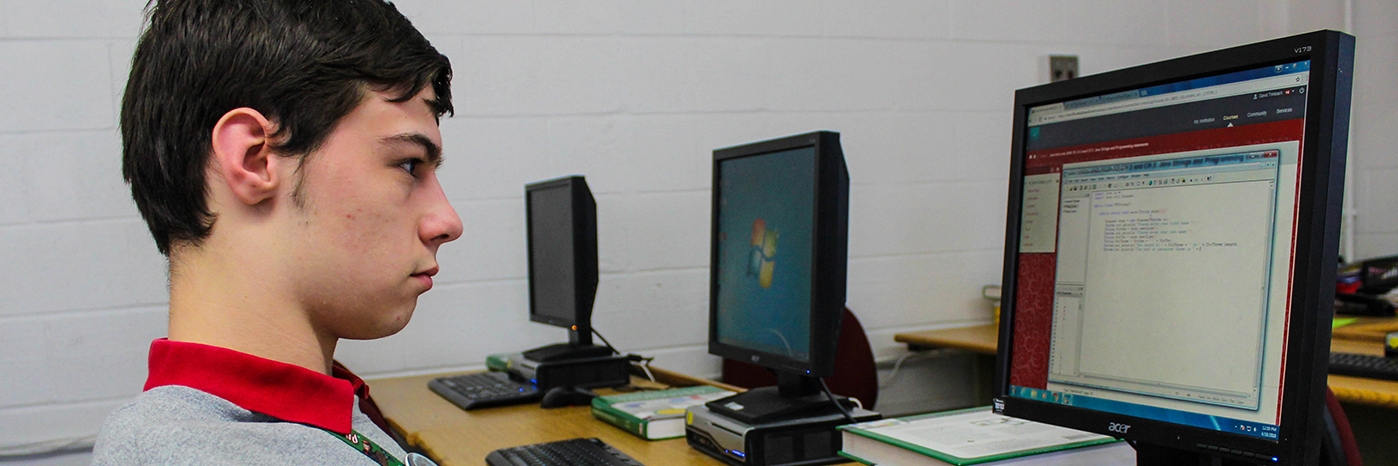Computer technology is changing the way Americans manage their business, formal studies, homes, and recreation. Advancing students' understanding of the principles and practices of computing like programming and coding is a major aspect of STEM Education and critical to developing a more competitive workforce of the modern world. We believe every student should achieve a basic level of computer skills at Carroll High School.
In addition to encouraging the use of the computer as a tool in other courses, the Computer Science Department offers a variety of formal computer courses. Students have hands-on use of computer-based instruction giving students the experience and technical skills necessary to be successful in life.
Computer Applications
Students will explore computer skills and applications needed on a personal, school/college, and career level. The focus of this course is to provide project and skills associated with Google Suite applications (including: Gmail, Drive, Docs, Slides, Sheets, Sites and Search) as well as applications for creating projects with professional formatting. Students will utilize computers and technology to increase efficiency, communication, and organization. Students will expand their knowledge of hardware and software terminology as well as emerging technologies. Students will explore online security fundamentals, including cybersecurity.
Computer Science Principles
This course is for students who have average keyboarding and computer skills. Students will develop or improve their knowledge of documents, spreadsheets, and presentation software. This course introduces students to the central ideas of computer science. Students will investigate the innovations that computing has made possible and examine ethical implication of new computing technologies.
Honors Computer Science Principles
This course introduces students to the central ideas of computer science, instilling the ideas and practices of computational thinking and inviting students to understand how computing changes the world. The course focuses on using technology as a means to solve computational problems. Students will investigate the innovations that computing has made possible and examine ethical implications of new computing technologies. The course is organized around the investigation of seven big ideas developed by the AP Computer Science curriculum. By the end of the course the students, will create one of the two required performance tasks, which require students to explore the impacts of computing.
Online Computer Science
Note: The course is offered only during the summer and will appear on Family Portal in the following Fall semester.
This course is for students who have average keyboarding and computer skills. Students will develop or improve their knowledge of documents, spreadsheets, and presentation software. This course introduces students to the central ideas of computer science. Students will investigate the innovations that computing has made possible and examine ethical implication of new computing technologies.
To participate in this course, students must have daily access to the internet. Each student is required to spend a minimum of 60 hours (independently) to fulfill the minimum course requirements. All course requirements and grades are available on an Online Learning Management System (Blackboard is currently being used).
Online Honors Computer Science Principles
Note: The course is offered only during the summer and will appear on Family Portal in the following Fall semester.
This course introduces students to the central ideas of computer science, instilling the ideas and practices of computational thinking and inviting students to understand how computing changes the world. The course focuses on using technology as a means to solve computational problems. Students will investigate the innovations that computing has made possible and examine ethical implications of new computing technologies. The course is organized around the investigation of seven big ideas developed by the AP Computer Science curriculum. By the end of the course, the students will create one of the two required performance tasks, which require students to explore the impacts of computing.
To participate in this course, students must have daily access to the internet. Each student is required to spend a minimum of 60 hours (independently) to fulfill the minimum course requirements. All course requirements and grades are available on an Online Learning Management System (Blackboard is currently being used).
Programming
This course introduces students to the principles of programming. This course provides a thorough introduction to programming concepts and emphasizes logic, object-oriented programming, and design. Students will develop problem-solving skills, including loops and selection statements. Students will also have the opportunity to apply the syntax of programming languages and properly document programs as well as design simple computer animations and computer games.
College Credit Plus Web Development and Design
Note: There is a course fee required by Sinclair Community College that may change year-to-year. These fees have the opportunity to be paid if parents apply through the State of Ohio to receive funding for three semester hours of CCP. If this funding is not secured, the student is responsible for the course fee.
Students will learn to apply best practices for web design and create sites that enhance the usability and interactivity of the pages using HTML HyperText Markup Language (HTML) a widely used technology to create and display content on the web. HTML is the primary language used for creating web pages including basic text formatting, linking between pages, and adding images and other media.
AP Computer Science Principles
This course will capture important aspects of the work that a computer scientist engages in at the level of competence expected of the AP Computer Science Principles student. The students will develop computational artifacts and analyze data, information, and knowledge represented for computational use. Students will learn to collaborate to build computation artifacts and communicate their purpose. By the end of the course, the students will create the required performance task, which require students to create computations artifacts though programming. This course will prepare students for the Computer Science Principles Advanced Placement test. This course could also count as ½ credit of mathematics.


